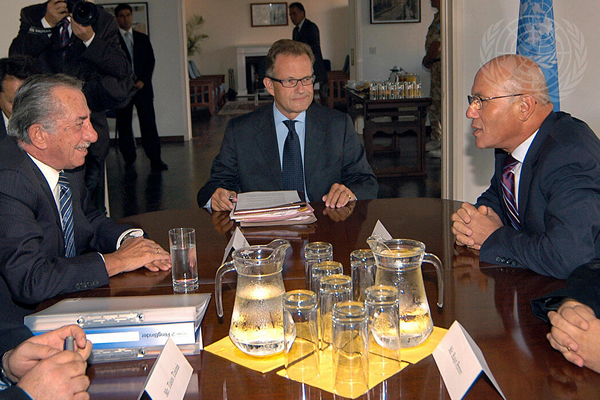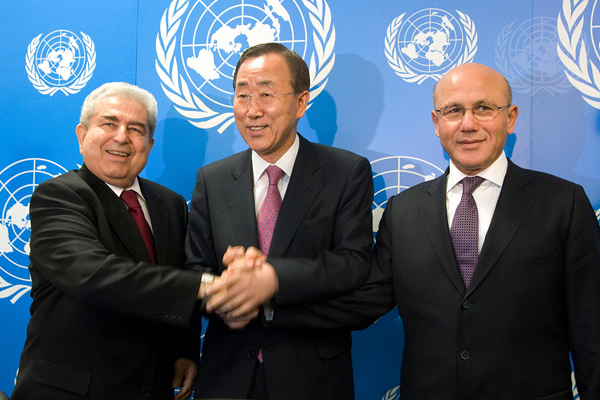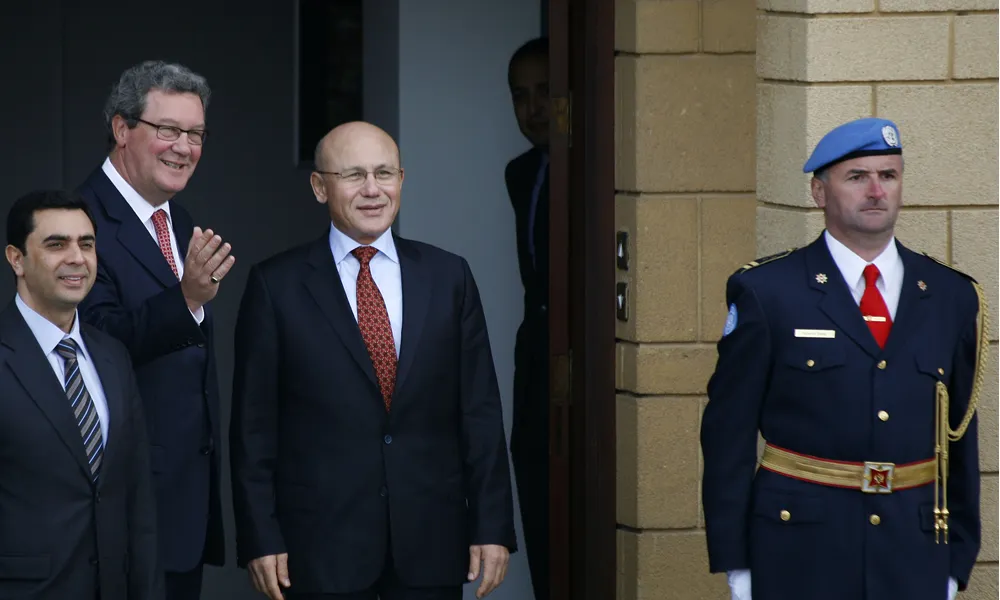Mehmet Ali Talat’s role leading up to the Annan Plan and then as leader of the Turkish Cypriots from 2005 to 2010 is considered one of the most positive in terms of his capacity to push for a solution, mostly – but not always – in coordination with Ankara.
When Talat replaced the historic leader of the Turkish Cypriots Rauf Denktaş, after the latter fell out of favour with the Justice and Development Party (AKP), he faced a bitter public, disappointed with the overwhelming rejection of the reunification plan by Greek Cypriots.
His interlocutor at the time, President Tassos Papadopoulos, had led the charge against the Annan Plan, seeing the UN blueprint as very problematic to the Greek Cypriot cause. In peace talks, however, Papadopoulos refrained from stipulating all the changes he wanted to make to the plan, making progress difficult, Talat told Politis.
Mutual respect and common goals
However, Talat had one thing going in his favour. Turkey, under the relatively new AKP government, shared a common goal with the Turkish Cypriots. Both wanted a solution, said Talat.
“Turkey was well aware of the fact that without a solution to the Cyprus problem, EU membership would not be possible, so we had a common target,” said Talat.
He noted that the relationship with Ankara was marked by mutual respect of positions and policies, frequent consultations and coordination.
“This was not the case in the years after, and particularly not now,” he said.
Turkey’s growing influence
Talat pointed out that in the current climate, Turkey’s presence and interventions in the north are very clearly felt. The Turkish Cypriot leadership appears very good at obeying Turkey’s demands and does not seem to do anything without asking their counterparts in Turkey first.
“It was very different when I was in power,” he said.
Turkey’s increasing influence in the north is also reflected in the spillover of authoritarian tendencies.
“But our courts, our newspapers, our understanding of the community in general, are still pro-democracy. They are not controlled in the way that the government is under control,” he said.
Denktaş favoured the military
The former leader noted that his relationship with Ankara was different not only to the current leadership but also to that of his predecessor, Denktaş, who had much better relations with the Turkish military, creating a very different dynamic.
Denktaş considered the military a “sacred organisation”. He would consult with the Turkish military – very powerful at the time – rather than the government.
His close collaboration with the military made it easier for Denktaş to influence the Turkish government when needed, and in some cases, to ignore it completely.
When Talat was opposition leader, in March 2003, Denktaş was due to go to The Hague to agree with Papadopoulos on submitting the Annan Plan for approval in separate referenda. The Turkish National Security Council had decided, in Denktaş’ presence, to not reject the UN Secretary-General’s proposal. However, Denktaş decided to say ‘no’. It later transpired that the military had told him to reject the proposal.

Good relations with AKP
Even before his election to power, Talat enjoyed good relations with leading AKP members, including Recep Tayyip Erdoğan and Abdullah Gül. Once in office, the relationship was upgraded, “because we had the same goal” – Turkey’s EU membership via a Cyprus solution.
According to Talat, Ankara was in favour of a solution during this period and respected his expertise on the Cyprus issue.
When UN Under-Secretary-General Ibrahim Gambari came to Cyprus in July 2006, the then UNSG Kofi Annan called during a meeting to speak to the two leaders, Talat and Papadopoulos, proposing they agree to a set of principles and decisions.
“Up to that point, the UNSG had asked the Greek Cypriot side to identify the changes they wanted to the Annan Plan and give them to the Secretary-General so they could be negotiated, if possible, with the Turkish Cypriots. We also insisted on this, but Tassos didn’t do it.”
During the call, Annan pushed the leaders to agree on changing tack, establishing technical committees and working groups to discuss high and low-level issues.
“For the sake of not rejecting the Secretary-General, I accepted his proposal during the phone call. Turkey was not aware of this. We then agreed on a text. After the meeting, I got in touch with Turkey and explained what we had done. They were not very pleased, but they didn’t say much regarding the result,” he said.
Talat bemoaned the fact that the two sides could not implement the Gambari agreement until Demetris Christofias came to power.
“Until Christofias, we couldn’t even agree on the names of the technical committees and working groups.”

Historic Ledra Street
The former leader noted that a similar pattern could be seen in negotiations on opening Ledra Street, which had kept the two communities apart in Nicosia’s old town since the 1960s.
With Papadopoulos, the two sides agreed to knock down the barricade on Ledra Street, but negotiations got stuck on opening the street to pedestrian traffic.
Talat explained it was a military area and the military wanted to maintain the ability to use it.
“I suggested we make a bridge so pedestrians could cross but Tassos didn’t want this. He put obstacles in the way because he didn’t want the crossing to open.”
Even though the military insisted that the bridge remain, Talat decided that he would remove it, without prior consultation with the Turkish government or military.
“I went to Turkey and visited the chief of the military. I persuaded him, together with the Turkish foreign minister, and they agreed to order the military in Cyprus to remove the bridge.”
However, according to Talat, his interlocuter raised new obstacles to the crossing’s opening.
“Papadopoulos wanted to know the status of the buffer zone, where the line of control goes up to, who would restore dangerous buildings, what would happen to some small military barricades there.
“When Christofias was elected, we got in touch and he said, ‘OK, let’s open it.’ Our negotiators came together and reached agreement.”
Asked whether all pending issues had been clarified, Talat replied, “Some yes, others were ignored.”
He added: “If you want to do something, you can find ways to do it.”

Groundbreaking negotiations
From 2008 to 2010, Christofias and Talat recorded a significant number of convergences, which became known as the Downer Convergences, based on leaked UN documents that detailed progress in the talks.
A critical point came in January 2010 when, in consultation with Turkey, Talat submitted a unilateral package of positions on a range of issues in the talks.
“We provided solutions to many critical issues in the negotiations, such as on the Flight Information Region, weighted and cross-voting for presidential elections, the equality of Turkish nationals with Greek nationals.”
At first, Christofias rejected the package. “He probably didn’t want to submit it to the National Council as a package, fearing criticism.”
Instead, the two leaders discussed the package’s elements one by one, ultimately reaching convergence on most issues within.
The breakthrough provision was the concept of cross-voting, where each community would vote for a candidate from the other community, through a weighted vote. It would be the first time in the history of the island that the two communities would vote for candidates from the other community.
“Of course, Turkey was not happy with cross-voting. I persuaded them. I asked them: ‘Do you want this agreement to be long lasting, or an agreement subject to sabotage?’ And they said, ‘go ahead’.”
Turkey’s policy shift
Talat acknowledged that things were different then because Ankara genuinely wanted a solution. Unlike today, where they are pushing for a two-state solution and recognition of the north.
“This is their genuine position now, but is it permanent? Can they be persuaded otherwise? I think so. It depends of course on what Turkey will get from a solution.”
In practice, EU membership is no longer on the table, while Erdoğan and the AKP have changed considerably since 2010. However, Talat continues to believe a solution would be in Ankara’s benefit, though he notes Turkey’s government also comprises the “very” Nationalist Movement Party (MHP).
Asked if a relationship of mutual respect could be restored with Ankara, he replied that with time, it was possible.
Talat noted that Erdoğan is a very pragmatic politician. The next Turkish Cypriot leader would have to persuade Ankara to change its position on a two-state solution, which only leads to adventures.
There are also knowledgeable and agreeable people in Ankara that could be utilised to make the case for change, said Talat
“It’s possible, but it may take some time.”
